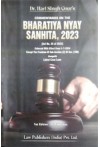- Author(s): Dr. Hari Singh Gour
- Publisher: Law Publishers (India) Pvt. Ltd.
- Edition: 1 Ed 2025
- Approx. Pages 2036 + Contents
- Format Hardbound
- Approx. Product Size 27 x 21 cms
- Delivery Time 3-5 working days (within Kerala & South India) (Others 7-9 days)
- Shipping Charge Extra (see Shopping Cart)
.....................................................................................................................................
Description
The new Criminal Laws enacted on 25th December, 2023, by the Central replacing the Indian Penal Code, 1860, the Code of Criminal Procedure 1973 and Government transforms the Criminal Justice delivery landscape of India by the Evidence Act, 1872 for the purpose of crime, which is usually defined as actions, mistakes or illegal activities that can be punished by the law, and Criminal Laws o hand in hand in every community. The main purpose of enforcing any Criminal Law is to ensure the accused bears the weight of their wrong doings and that the aggrieved party gets justice through well-established legal processes.
Criminal Laws in India have its roots in the Vedic period and these laws were made way back during the rule of Hindu and Muslim monarchs. It was only during British rule the drive towards systematization really gained steam in India. Hence, the modern Criminal Justice System in India was heavily influenced by the British legal system. These practices, which are reasonable and up-to-date, make up for a big part of the Criminal Laws that are still in place till date.
Bharatiya Nyaya Sanhita, 2023 enforced w.e.f. 1st July, 2024 (except Sec. 106(2)) replacing the Indian Penal Code, 1860 now has 358 Sections instead of 511 Sections in the Code of 1860. 175 Sections have been changed, 8 new sections have been inserted and 22 existing sections have been repealed.
This newly enacted law now includes new provisions for severe punishment of transnational gangs and Organised Crime, as well as a provision for the confiscation of the property of declared criminals. For the first time, sexual intercourse under the pretext of "marriage, employment, promotion and false identity" has been made a punishable offence with a provision for 20 years of imprisonment and life imprisonment in all cases pertaining to gang rape. These new laws protect women and children more comprehensively, besides preventing police abuse of authority. The maximum sentence for crimes committed in the presence of minors has been increased from seven years to ten years in prison while several enhanced provisions have been introduced to increase fines for a variety of offences. Petty crimes like chain or mobile snatching from women is now a punishable offence with specific provisions as provided in the new law.
Besides, the new law has introduced provisions of capital punishment (Death Sentence) for crimes committed on girls below the age of 18 years. Mob lynching also carries with it a potential Death Sentence, or seven years in jail or life imprisonment, as per severity of the crime committed. Section 150 of the B.N.S., 2023 retains an offence of sedition with new terminology with a more extensive definition of "Act endangering sovereignty, unity and integrity of India". Now for this offence the maximum sentence is still life imprisonment.
......................................................................................................................................
Table of Contents
Chapter 1. Preliminary
Chapter 2. Of Punishments
Chapter 3. General Exceptions
Chapter 4. Of Abetment, Criminal Conspiracy and Attempt
Chapter 5. Of Offences Against Woman and Child
Chapter 6. Of Offences Affecting the Human Body
Chapter 7. Of Offences Against the State
Chapter 8. Of Offences Relating to the Army, Navy and Air Force
Chapter 9. Of Offences Relating to Elections
Chapter 10. Of Offences Relating to Coin, Currency - Notes, Bank - Notes, and Government Stamps
Chapter 11. Of Offences Against the Public Tranquality
Chapter 12. Of Offences by or Relating to Public Servents
Chapter 13. Of Contempts of the Lawful Authority of Public Servants
Chapter 14. Of False Evidence and Offences Against Public Justice
Chapter 15. Offences Affecting the Public Health, Safety, Convenience, Decency and Morals
Chapter 16. Offences Relating to Religion
Chapter 17. Of Offences Against Property
Chapter 18. Of Offences to Documents and to Property Marks
Chapter 19. Of Criminal Intimidation, Insult, Annoyance
Chapter 20. Repeal and Savings
......................................................................................................................................
Author Details
Hari Singh Gour

